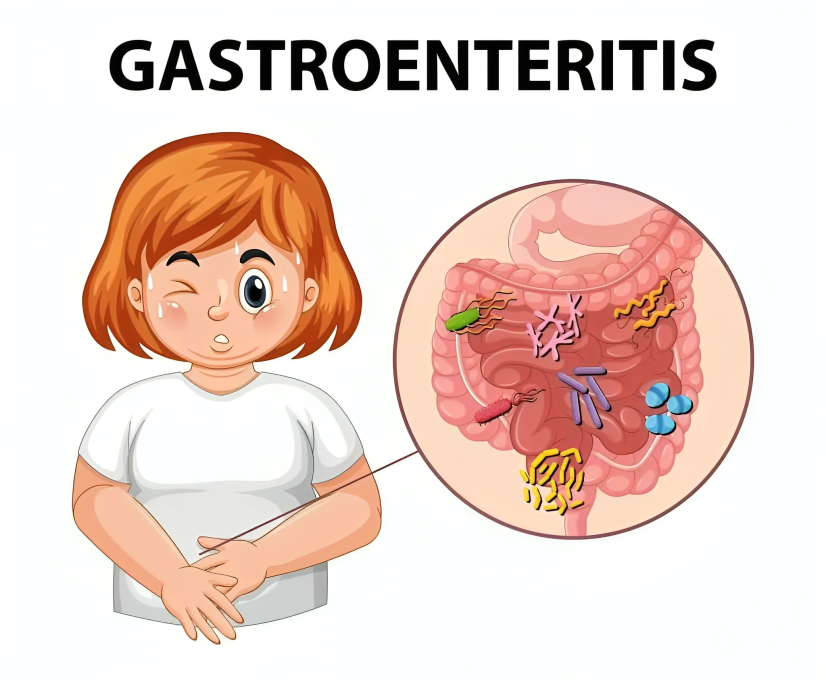Gastroenteritis is a common stomach illness that affects both kids and adults. It is often referred to as the “stomach flu” because it causes upset stomach, diarrhea, and vomiting. Although uncomfortable, gastroenteritis is usually not dangerous if handled properly. Identifying the symptoms early is crucial for effective management. This illness can spread quickly, especially in crowded places like schools or daycare centers, making awareness important for prevention.
This guide will explain gastroenteritis in a simple way. You’ll learn the key signs, causes, and how to spot it early. We will also cover how to manage it at home and when it’s necessary to seek medical help. Using easy-to-understand language, this article aims to help you protect yourself and others from gastroenteritis.
What is Gastroenteritis?
Gastroenteritis is an infection that affects the stomach and intestines. It occurs when a person consumes contaminated food or water containing bacteria, viruses, or parasites. This infection irritates the stomach lining, leading to digestive problems like diarrhea and vomiting. While anyone can get gastroenteritis, young children and elderly adults are more susceptible.
This illness is common and spreads easily, especially during winter. However, it can happen at any time of the year. Many people confuse gastroenteritis with food poisoning, as both cause similar symptoms like stomach discomfort and diarrhea. The key difference is that gastroenteritis is usually caused by viruses, while food poisoning is often due to harmful bacteria in bad food.
For most people, gastroenteritis lasts a few days, and with proper care, symptoms tend to improve. However, in severe cases, it can lead to dehydration, which requires medical attention.
Please visit our other article: https://biosjourney.com/blogs/recifest-empowering-communities-for-a-greener-future/
How Does Gastroenteritis Spread?
Gastroenteritis spreads in several ways, including:
- Direct Contact: If you come into contact with someone who has the illness and don’t wash your hands, you may also get infected.
- Contaminated Food or Water: Consuming food or water that contains viruses or bacteria can lead to gastroenteritis.
- Dirty Surfaces: Germs can live on objects like toys, door handles, or shared utensils. Touching these surfaces and then eating without washing hands can cause infection.
- Airborne Transmission: Some viruses can spread through the air when an infected person sneezes or vomits.
This illness spreads especially fast in places where people are close to each other, like schools or nursing homes. Knowing how gastroenteritis spreads helps you take steps to avoid it and protect your family.
Key Signs of Gastroenteritis
Recognizing the symptoms of gastroenteritis early is essential for effective treatment. Here are the most common signs:
- Diarrhea: One of the most noticeable symptoms is frequent, watery stools.
- Vomiting: Nausea followed by vomiting is common, helping the body remove harmful substances.
- Stomach Pain and Cramps: Many people experience sharp stomach pains or cramps.
- Fever: A mild fever may accompany the infection, particularly if it’s viral.
- Loss of Appetite: Due to the stomach upset, many people lose their desire to eat.
These symptoms usually show up within a day or two after infection. In most cases, they clear up within a few days, but if they persist, it’s important to consult a doctor.
When to See a Doctor
Although gastroenteritis often resolves on its own, there are instances where medical help is necessary. Here are some symptoms that you should go to a doctor:
- Severe Dehydration: If someone has a dry mouth, feels dizzy, or hasn’t urinated for several hours, they may be dehydrated.
- Blood in Stool or Vomit: If there’s blood, it could indicate a more serious issue.
- High Fever: A fever higher than 102°F (39°C) that doesn’t go down needs medical attention.
- Prolonged Symptoms: If diarrhea or vomiting continues for more than three days, seek help.
- Inability to Keep Liquids Down: If someone can’t drink water without vomiting, they may need treatment for dehydration.
Recognizing these warning signs ensures timely medical care and prevents the illness from getting worse.
How to Treat Gastroenteritis at Home
Most cases of gastroenteritis can be treated at home using simple remedies. Here are a few tips:
- Stay Hydrated: Replacing lost fluids is essential, so drink water, clear broths, or oral rehydration solutions.
- Eat Mild Foods: Stick to easy-to-digest foods like bananas, rice, applesauce, and toast (BRAT diet) until your stomach feels better.
- Rest: Ensuring you get plenty of rest gives your body the time it needs to heal and recover properly.
- Medication (if needed): Over-the-counter medications can help reduce symptoms, but it’s best to check with a doctor, especially for children.
- Maintain Hygiene: Wash hands often and keep surfaces clean to prevent spreading the illness to others.
Following these steps can speed up recovery and reduce the risk of spreading gastroenteritis to other family members.
How to Prevent Gastroenteritis
Preventing gastroenteritis is the best approach to avoid its discomfort. Here are some ways to protect yourself:
- Wash Hands Regularly: Always use soap and water, especially before eating and after using the restroom.
- Eat Cooked Foods: Make sure your food is thoroughly cooked to kill any harmful bacteria.
- Drink Safe Water: Drink only clean, filtered, or boiled water.
- Clean Surfaces: Frequently disinfect surfaces that come into contact with food or hands, such as kitchen counters.
- Avoid Close Contact: If someone in your household has gastroenteritis, try to minimize direct contact until they recover.
By following these simple preventive steps, you can significantly lower your risk of getting gastroenteritis.
Conclusion
Gastroenteritis is a common yet manageable illness. Understanding the symptoms and knowing how to treat it can make a big difference. Most cases get better with rest, fluids, and proper home care. However, it’s important to know when to seek medical help if symptoms worsen.
By practicing good hygiene, staying informed, and being cautious with food and water, you can help protect yourself and your family from this stomach illness. Quick action and proper care are the keys to keeping everyone healthy and safe from gastroenteritis.



